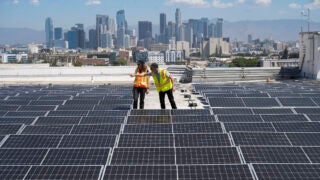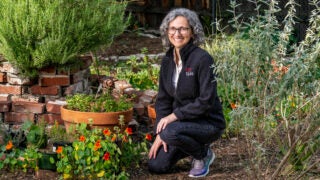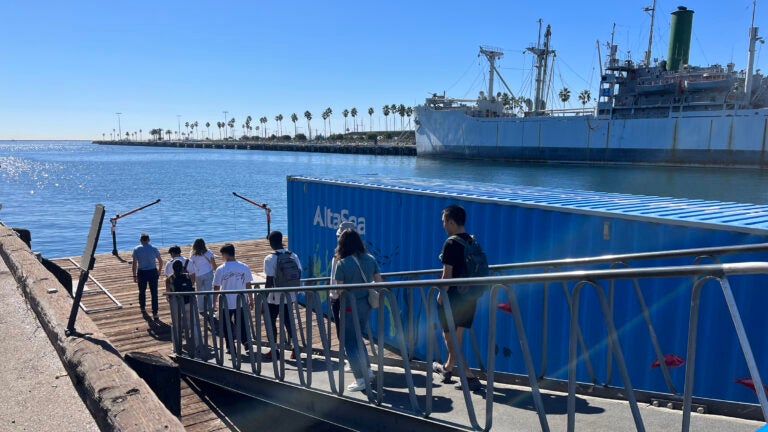
Alan Hill, educational director at AltaSea, leads USC students to the Kelp Barge, where the young kelp plants grown in K-12 classrooms through the Kelp Kits for Kids project will be transferred to an underwater trellis. (Photo/Elisabeth Arnold Weiss)
Helping students gain practical sustainability experience: Q&A with Elisabeth Arnold Weiss
GREEN WEEK: Weiss, associate professor of technical communication practice at USC Viterbi, breaks down how students at USC are addressing sustainability issues.
At USC, learning about sustainability doesn’t always begin in a classroom. Elisabeth Arnold Weiss, associate professor of technical communication practice at the USC Viterbi School of Engineering, created the ATLAS Project (Advancing Technology Leadership and Access through Service) as a way of involving students in learning projects that address important sustainability and social impact issues while also making a positive difference in the local community.
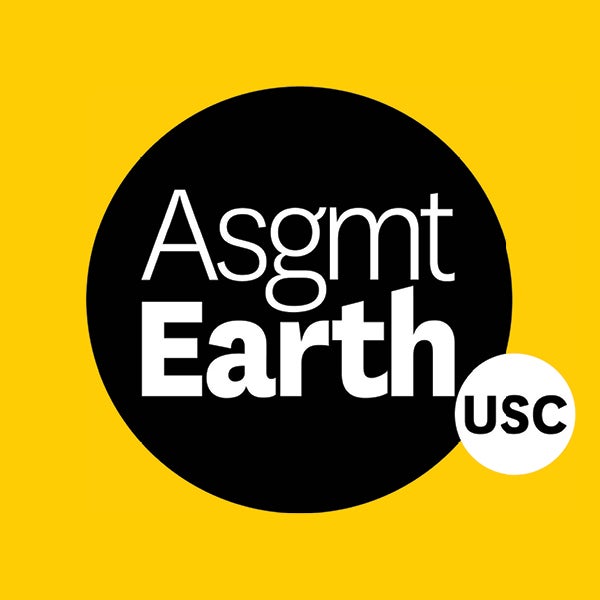
Weiss, who recently celebrated 25 years of designing curricular-based community projects at USC, sat down with USC News to discuss how her initiatives benefit students.
What is the core message of the ATLAS Project?
Weiss: The core message of ATLAS is that we are all connected. Throughout the campus, the surrounding community, the oceans and the air we breathe. Sustainability is a shared purpose and if we take an “all in” approach, a just and sustainable world is within reach. We are optimistic about the future and eager to collaborate to ensure scarce resources are replenished and future generations can flourish.
ATLAS is experiential community-engaged learning that offers opportunities for students to apply content knowledge to authentic projects, collaborate with real-world partners and create specific micro-transformations that produce network effects of sustainable impact. Projects are designed to cultivate ethical leadership in technology, socialize engineering and expand access to the field, and advance sustainability education and actions for societal benefit. Sustainability is a core principle of engineering, and working toward sustainability is an ethical choice.
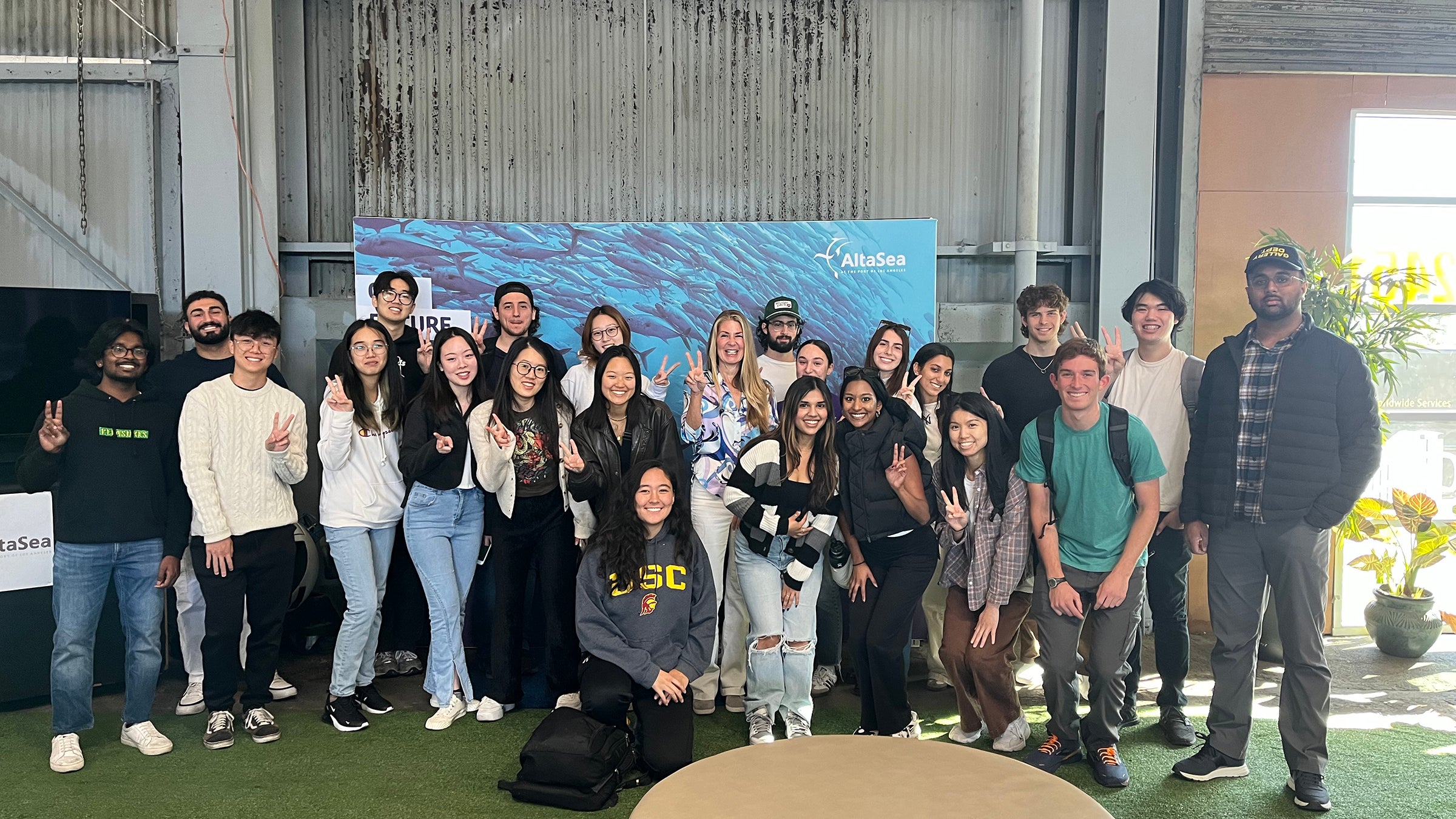
Our “People not PowerPoints” approach to learning focuses on the people and the relationships we build through an equity-minded and collaborative learning experience. We commit to “Scaling through Sharing” by creating replicable models and sharing them with community partners and the public to make a broad impact. “Ethics in Action” means we enact USC’s Unifying Values and cultivate character attributes such as justice, humility, empathy and compassion.
What are some specific sustainability-related projects?
Weiss: Kelp Kits for Kids: We partner with AltaSea at the Port of Los Angeles to learn about regenerative aquaculture and the emerging industries developing ocean-based sustainable food sources with minimal environmental impact. Students design the Kelp Kits to stimulate interest and embed educational resources about sustainability directly into classrooms throughout Los Angeles. These high-impact projects have reached thousands of middle school students in the past year through curricular integration and popular public events.
Sustainable Garden Designs: We partner with an intermediate school in South L.A. to transform their garden beds into working models of sustainable urban garden design and science labs to test out sustainable practices. These models have been shared widely with schools in L.A. and replicated in similar urban areas.
Future Stories: Students use creative foresight and imagination to envision the future human and social experience at the Los Angeles [Memorial] Coliseum in 2028 and communicate their vision for sustainability and enriching life through the arts, using AI tools and classical storytelling. These stories inspire us to take actions today to shape a sustainable future.
What do students get out of it?
Weiss: They love going beyond the classroom and the dynamic nature of experiential learning. Through our site visits with community partners, they see the complexity of L.A. and appreciate how USC is uniquely situated in the heart of L.A., near the evolving coastline, and at the cutting edge of emerging sustainability-focused technologies. We also connect with many resources right here on campus, from learning principles of ethical community engagement with [the USC Joint Educational Project], to sustainability initiatives and training through the USC Sustainability Hub, to hosting a campus sustainability tour for community partner guests. These activities contribute to the overall feeling of connectedness to their school and their learning experience.
Engineers play an important role as translational agents who communicate directly with the public about science, bridging the gap between technology and society, and innovating new educational resources to make a positive social impact on the next generation.
How does learning about sustainability benefit students?
Weiss: Climate change is one of the most pressing challenges we face, and a sustainable future is both urgent and distant. ATLAS gives students a sense of agency, where they can take actions to mitigate climate change now, make an immediate and visible social impact, and a lasting contribution to sustainability awareness as their projects live on in the community.
This gives students a sense of being a part of something bigger than themselves and involves them in USC’s mission, arc of purpose and ever-expanding network.
How does the project benefit them personally, as people?
Weiss: This is where our students are going — they are pushing us in this direction. They want to be successful, to connect with people from all walks of life, and they genuinely want to make the world a better place. These experiences are transformational for students, setting them on a course to use their USC education for good, orienting them around purpose and ethical choices, giving them opportunities to make a lasting impact, and to shape the future they will inhabit. ATLAS instills in them the essence of who we are as a culture: connective, collaborative and innovative.
ATLAS encourages participation in USC’s institutional “moonshot” toward sustainability by making our goals and efforts accessible, inclusive and collaborative as we engage in a communitywide effort to build a just and equitable future. The students are driving us toward sustainability. I am just showing them ways forward.

